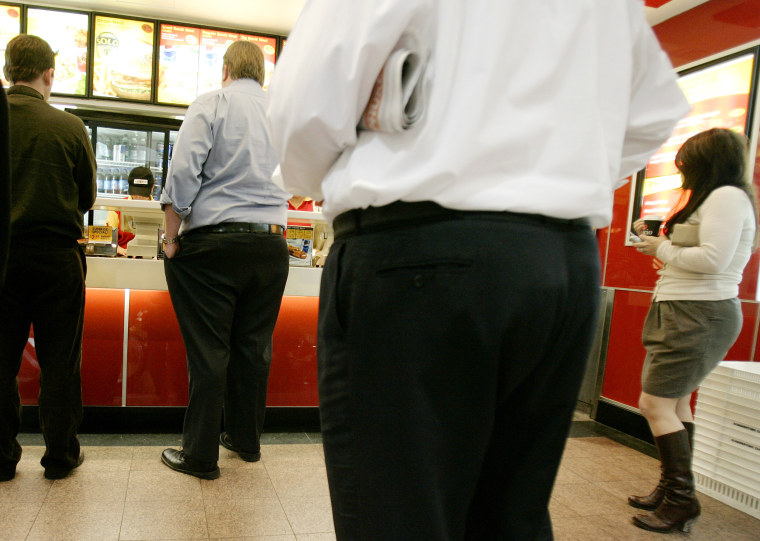Everyone knows fast food isn’t healthy, and it’s been linked to weight gain and the obesity epidemic. After all, most fast food is laden with fat, sugar, salt and processed carbs — all the stuff any doctor can tell you to cut back on.
But a new study from U.S. and Irish researchers puts a precise number on it. They found that for every extra fast-food transaction in a country — every time someone bought a hamburger or a serving of fried chicken — the average BMI went up by 0.03.
They say this means governments need to make fast food less attractive to their citizens.
“The take-home message is that, although free-market policies are not to be demonized, it appears quite clear that in order to fight the obesity epidemic, a stronger role of government intervention is necessary,” says Dr. Roberto De Vogli of the department of Public Health Sciences at the University of California, Davis, who headed up the study.
Body mass index or BMI is the globally accepted measure of obesity. It’s a calculated ratio of height to weight. Someone who is 5 feet 5 inches tall and weighs 149 pounds has a BMI of 24, considered a healthy weight. Add a pound and the same person has a BMI of 25 and is considered overweight. At 170 pounds this person has a BMI of 40 and is considered obese.
De Vogli’s team got data on the number of fast-food transactions per capita from 1999 to 2008 in 25 high-income countries and compared them with average BMI in the same countries over the same time.
“While the average number of annual fast food transactions per capita increased from 26.61 to 32.76, average BMI increased from 25.8 to 26.4,” they reported in the Bulletin of the World Health Organization.
Every unit of increase in annual fast-food transactions per capita was associated with an increase of 0.033 points of BMI, they found.
De Vogli says they took into account all sorts of factors, such as how much exercise people got in each country, urbanization, age and so on. As countries get richer, people eat less at home and eat out more, and fast-food outlets invariably become part of the mix. At the same time, people drive more and walk less, but De Vogli says the calculations account for this.
One thing they don’t account for is other potential sources of junk food, he said. “To be completely fair to the fast-food industry, highly processed food, all those types of processed products are also higher where there is higher fast-food consumption,” he told NBC News. “So we will look at that next.”
The United States was already saturated with fast food when the study started, so there wasn’t much change. More than two-thirds of Americans are overweight or obese.
De Vogli’s team found the sharpest increases in both fast-food intake and BMI were in Canada, Australia, Ireland and New Zealand. “The more aggressive market-liberalized countries have a higher consumption of fast food,” De Vogli said.
The lowest increases were in countries with more stringent market regulation, such as Italy, the Netherlands, Greece and Belgium. “Trade protection might not always be a good thing, but our study found consumption of fast food was much lower in countries that have higher regulation.”
China is one developing country that has recently embraced fast food, and also noted a sharp rise in obesity, but De Vogli says his team only looked at members of the Organization for Economic Cooperation and Development.
“Unless governments take steps to regulate their economies, the invisible hand of the market will continue to promote obesity worldwide with disastrous consequences for future public health and economic productivity,” De Vogli said.
The team also looked at data from the United Nations Food and Agricultural Organization, and found people ate a little less animal fat — something that should be good for health. On average, intake of animal fats decreased slightly from 212 calories per capita per day in 1999 to 206 in 2008. But people were still overeating — a lot. On average, people ate 3,432 calories per capita per day in 2002 and 3,437 in 2008. But most people only need 2,000 to 2,500 calories a day.
“This study shows how important public policies are for addressing the epidemic of obesity,” said Dr. Francesco Branca, director of the Department of Nutrition for Health and Development at WHO.
“Policies targeting food and nutrition are needed across several sectors including agriculture, industry, health, social welfare and education,” Branca said.
De Vogli recommends policies protecting small farmers and encouraging people to eat local produce. U.S. officials are debating policies such as taxes on sugars or sodas and cities such as New York have banned the unhealthiest trans fats from food, and the Food and Drug Administration is following suit.
Some U.S. food makers have worked to cut the number of calories they produce, and the federal government says Americans are eating at home a little more.
